中考英语八种时态归纳复习课件(39张PPT)
文档属性
| 名称 | 中考英语八种时态归纳复习课件(39张PPT) | 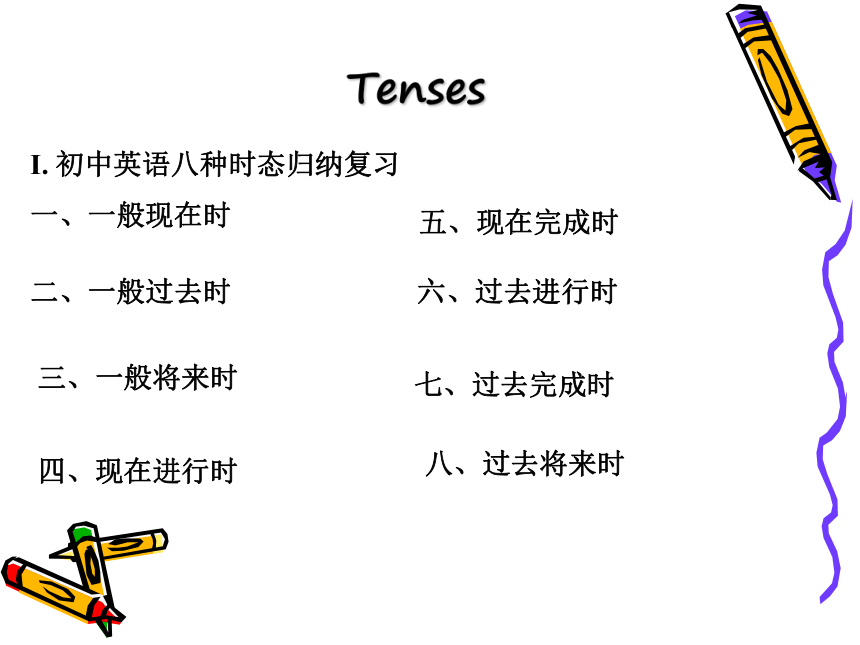 | |
| 格式 | zip | ||
| 文件大小 | 372.0KB | ||
| 资源类型 | 教案 | ||
| 版本资源 | 通用版 | ||
| 科目 | 英语 | ||
| 更新时间 | 2019-12-27 16:09:12 | ||
图片预览

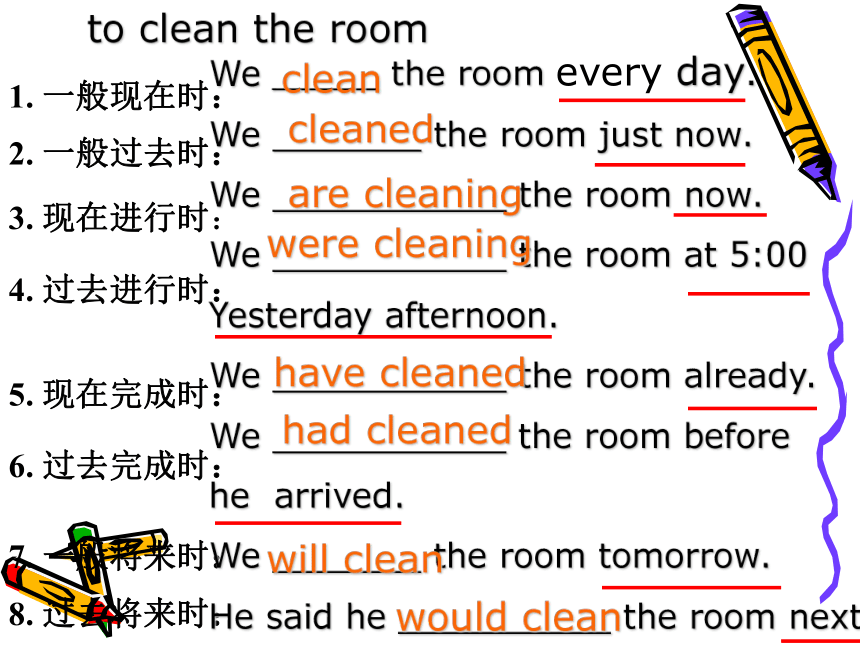
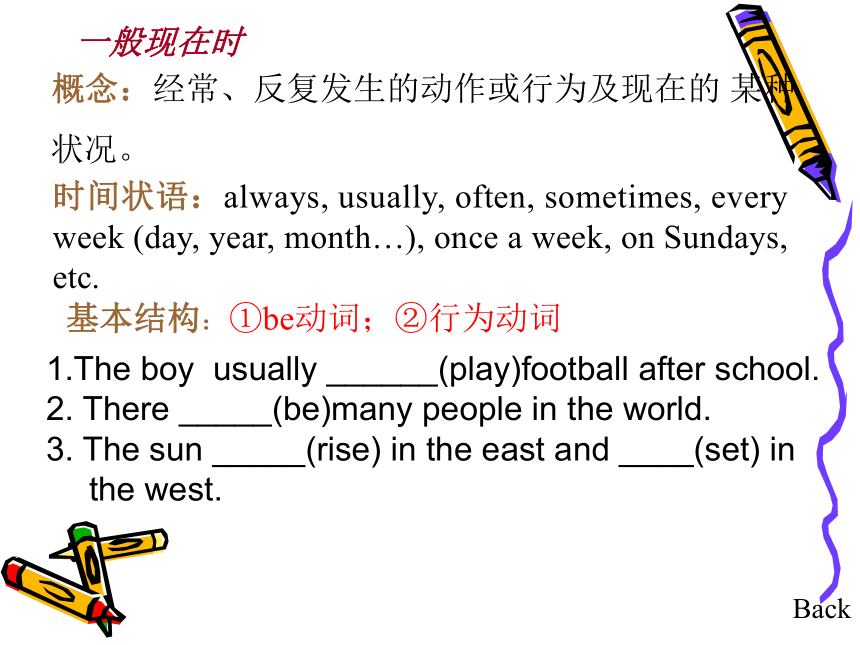
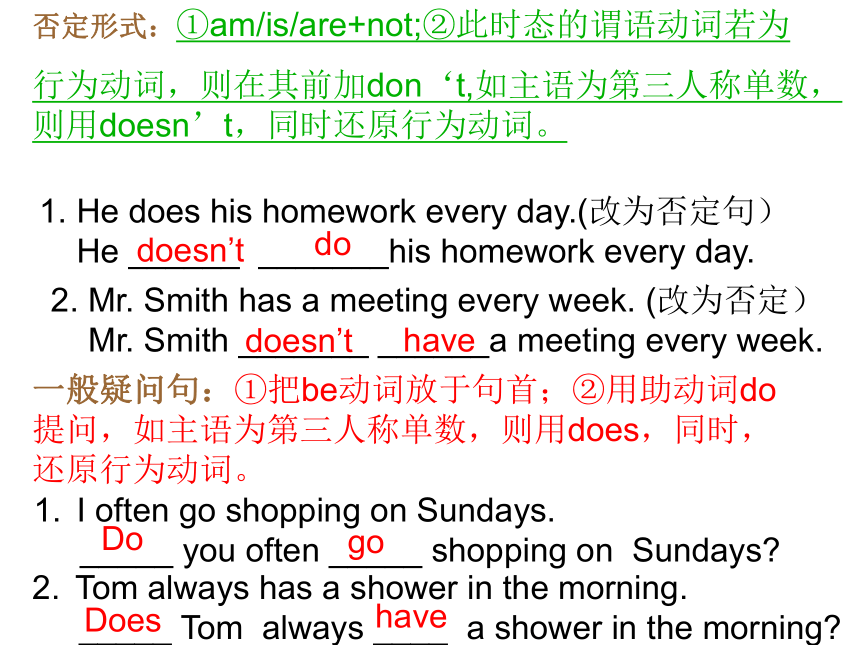
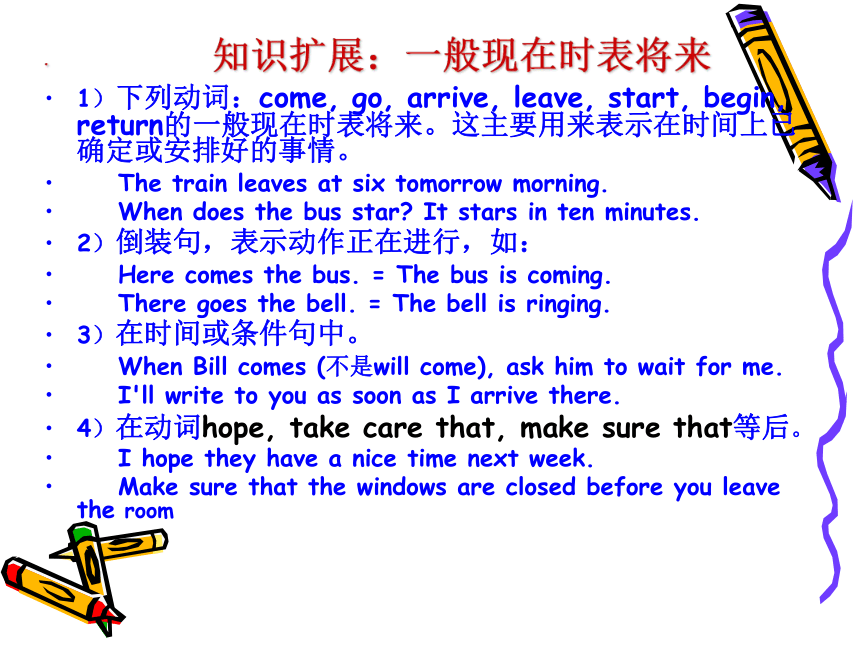
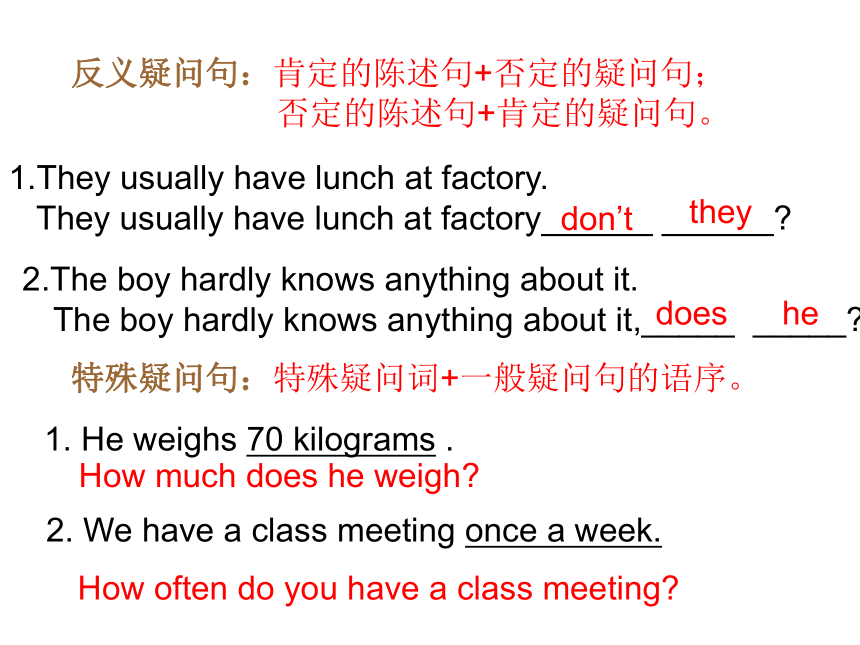
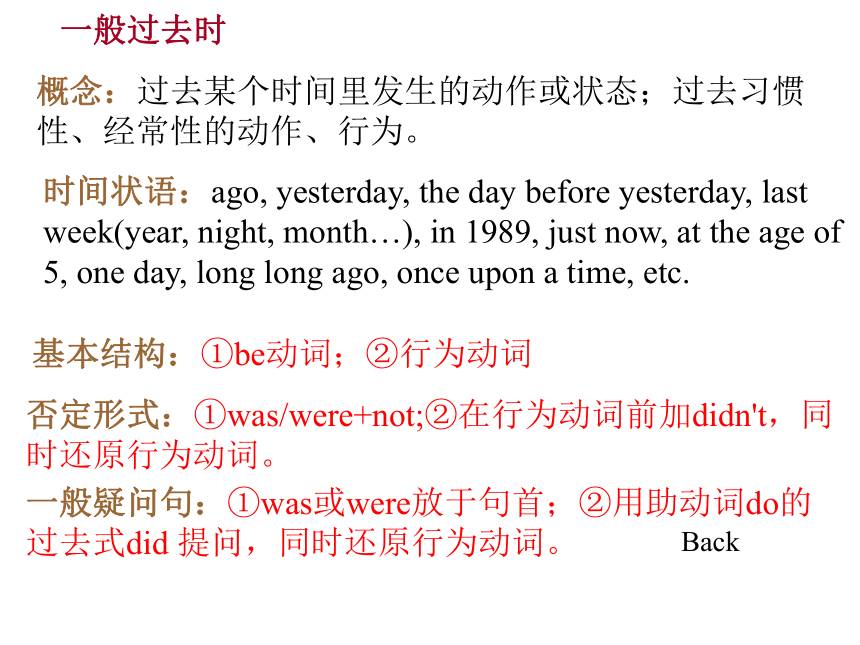
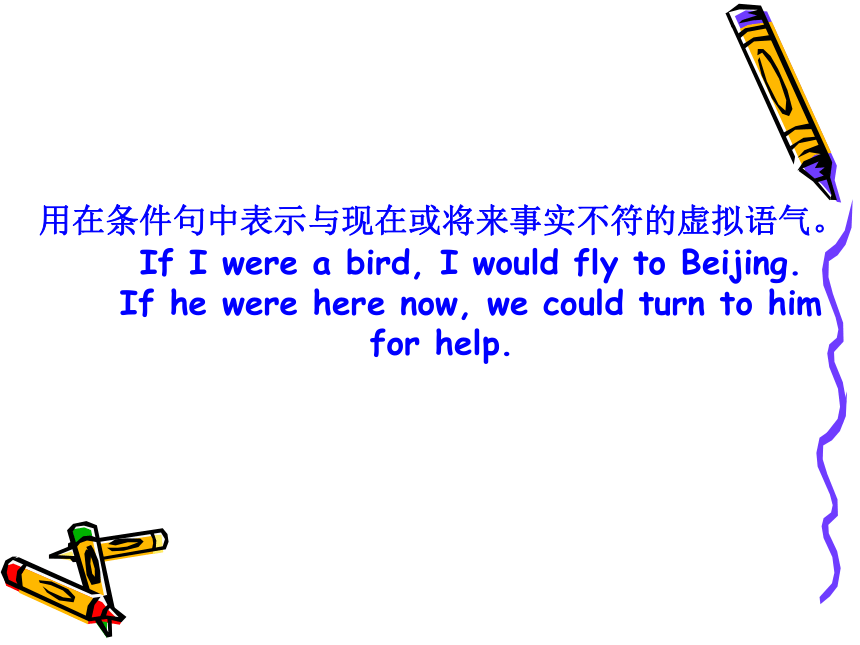
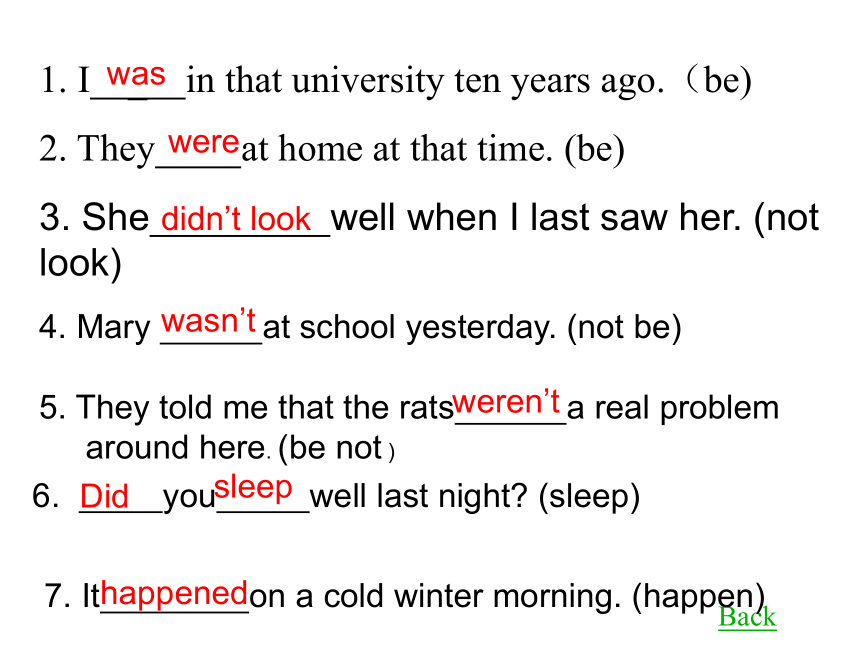
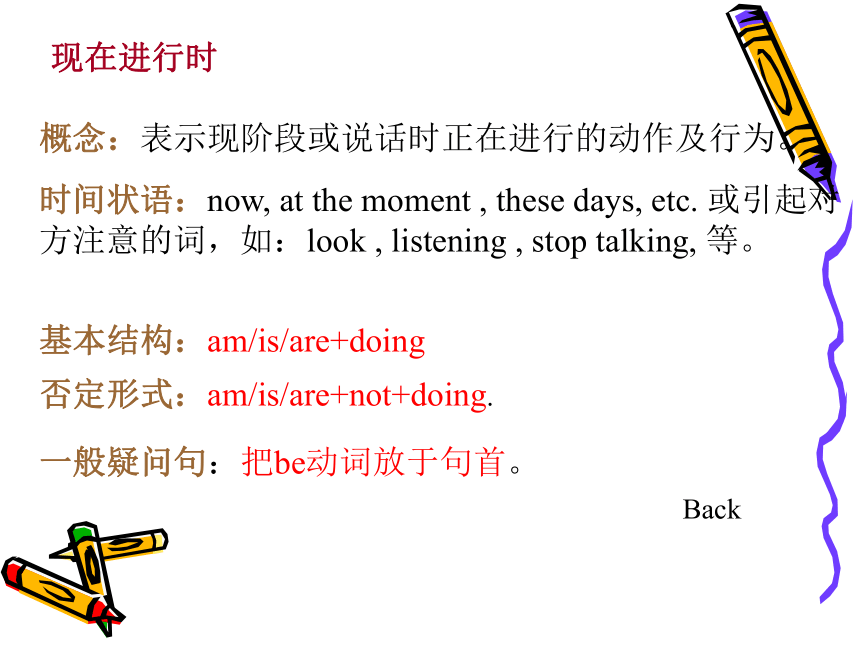
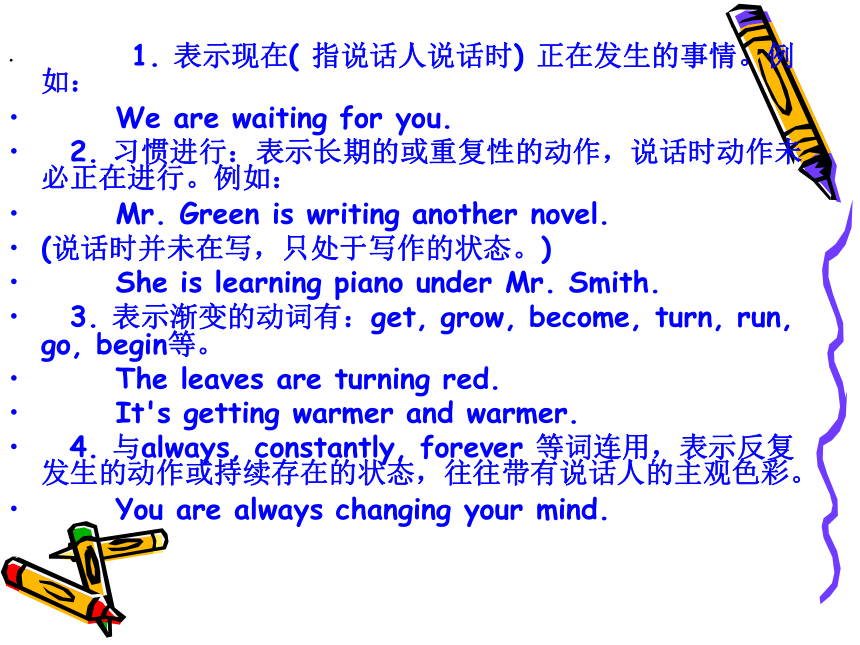
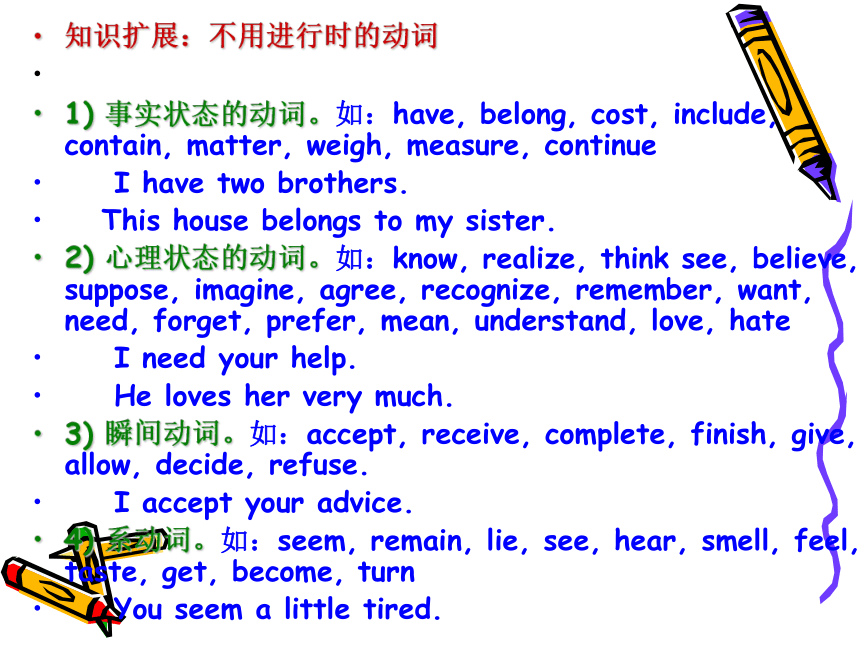
文档简介
(共40张PPT)
Tenses
Ⅰ. 初中英语八种时态归纳复习
一、一般现在时
二、一般过去时
三、一般将来时
四、现在进行时
五、现在完成时
六、过去进行时
八、过去将来时
七、过去完成时
to clean the room
1. 一般现在时:
2. 一般过去时:
3. 现在进行时:
4. 过去进行时:
5. 现在完成时:
6. 过去完成时:
7. 一般将来时:
8. 过去将来时:
We _____ the room every day.
We _______ the room just now.
We ___________ the room now.
We ___________ the room at 5:00
Yesterday afternoon.
We ___________ the room already.
We ___________ the room before
he arrived.
We _______ the room tomorrow.
He said he __________ the room next.
clean
cleaned
are cleaning
were cleaning
have cleaned
had cleaned
will clean
would clean
概念:经常、反复发生的动作或行为及现在的 某种
状况。
Back
时间状语:always, usually, often, sometimes, every week (day, year, month…), once a week, on Sundays, etc.
基本结构:①be动词;②行为动词
1.The boy usually ______(play)football after school.
2. There _____(be)many people in the world.
3. The sun _____(rise) in the east and ____(set) in the west.
一般现在时
否定形式:①am/is/are+not;②此时态的谓语动词若为
行为动词,则在其前加don‘t,如主语为第三人称单数,则用doesn’t,同时还原行为动词。
一般疑问句:①把be动词放于句首;②用助动词do提问,如主语为第三人称单数,则用does,同时,还原行为动词。
1. He does his homework every day.(改为否定句)
He ______ _______his homework every day.
2. Mr. Smith has a meeting every week. (改为否定)
Mr. Smith _______ ______a meeting every week.
doesn’t
do
doesn’t
have
I often go shopping on Sundays.
_____ you often _____ shopping on Sundays?
Tom always has a shower in the morning.
_____ Tom always ____ a shower in the morning?
Do
go
Does
have
知识扩展:一般现在时表将来
1)下列动词:come, go, arrive, leave, start, begin, return的一般现在时表将来。这主要用来表示在时间上已确定或安排好的事情。
The train leaves at six tomorrow morning.
When does the bus star? It stars in ten minutes.
2)倒装句,表示动作正在进行,如:
Here comes the bus. = The bus is coming.
There goes the bell. = The bell is ringing.
3)在时间或条件句中。
When Bill comes (不是will come), ask him to wait for me.
I'll write to you as soon as I arrive there.
4)在动词hope, take care that, make sure that等后。
I hope they have a nice time next week.
Make sure that the windows are closed before you leave the room
1.They usually have lunch at factory.
They usually have lunch at factory______ ______?
2.The boy hardly knows anything about it.
The boy hardly knows anything about it,_____ _____?
don’t
they
does
he
反义疑问句:肯定的陈述句+否定的疑问句;
否定的陈述句+肯定的疑问句。
特殊疑问句:特殊疑问词+一般疑问句的语序。
1. He weighs 70 kilograms .
How much does he weigh?
2. We have a class meeting once a week.
How often do you have a class meeting?
概念:过去某个时间里发生的动作或状态;过去习惯性、经常性的动作、行为。
时间状语:ago, yesterday, the day before yesterday, last week(year, night, month…), in 1989, just now, at the age of 5, one day, long long ago, once upon a time, etc.
基本结构:①be动词;②行为动词
Back
否定形式:①was/were+not;②在行为动词前加didn't,同时还原行为动词。
一般疑问句:①was或were放于句首;②用助动词do的过去式did 提问,同时还原行为动词。
一般过去时
用在条件句中表示与现在或将来事实不符的虚拟语气。
If I were a bird, I would fly to Beijing.
If he were here now, we could turn to him for help.
1. I _ in that university ten years ago.(be)
2. They at home at that time. (be)
3. She well when I last saw her. (not look)
Back
6. you well last night? (sleep)
7. It on a cold winter morning. (happen)
4. Mary at school yesterday. (not be)
5. They told me that the rats a real problem
around here. (be not )
was
were
didn’t look
wasn’t
weren’t
Did
sleep
happened
概念:表示现阶段或说话时正在进行的动作及行为。
时间状语:now, at the moment , these days, etc. 或引起对方注意的词,如:look , listening , stop talking, 等。
基本结构:am/is/are+doing
否定形式:am/is/are+not+doing.
一般疑问句:把be动词放于句首。
Back
现在进行时
1. 表示现在( 指说话人说话时) 正在发生的事情。例如:
We are waiting for you.
2. 习惯进行:表示长期的或重复性的动作,说话时动作未必正在进行。例如:
Mr. Green is writing another novel.
(说话时并未在写,只处于写作的状态。)
She is learning piano under Mr. Smith.
3. 表示渐变的动词有:get, grow, become, turn, run, go, begin等。
The leaves are turning red.
It's getting warmer and warmer.
4. 与always, constantly, forever 等词连用,表示反复发生的动作或持续存在的状态,往往带有说话人的主观色彩。
You are always changing your mind.
知识扩展:不用进行时的动词
1) 事实状态的动词。如:have, belong, cost, include, contain, matter, weigh, measure, continue
I have two brothers.
This house belongs to my sister.
2) 心理状态的动词。如:know, realize, think see, believe, suppose, imagine, agree, recognize, remember, want, need, forget, prefer, mean, understand, love, hate
I need your help.
He loves her very much.
3) 瞬间动词。如:accept, receive, complete, finish, give, allow, decide, refuse.
I accept your advice.
4) 系动词。如:seem, remain, lie, see, hear, smell, feel, taste, get, become, turn
You seem a little tired.
Back
1.It is six o’clock now. Jack _________newspapers.
(deliver)
2. It is late at night. _______the twins still _______TV?
(watch)
3. Don’t shout. Our teachers ________an important
meeting in the next room? (have)
4. A: Where is your monitor ?
B: He __________a model ship in the classroom. (make)
5. _____you_______ better today? (feel)
6. Spring is here. It_________warmer and warmer.(get)
概念:1、表示过去某一时刻或某段时间正在发生或进行的行为或动作。
时间状语: at that time, this time yesterday, at eight o’clock last night , from May to October last year 等。
基本结构:was/were+doing
否定形式:was/were + not + doing.
一般疑问句:把was或were放于句首。
Back
过去进行时
2、表示过去的一个动作发生的时候,另一个动作
正在进行。
以when引导的谓语动词是一般过去时的时间状语等。
1. --_____ he _____ TV this time yesterday?
--No, he ______.(watch)
2. They _______(not do)homework when I got back.
3. When I called him, he ______(have)dinner.
Back
4. While Mary _______(work)as a waitress , her friends _______(study) at university.
概念:过去发生或已经完成的动作对现在造成的影响或结果,或某个从过去已经开始,持续到现在的动作或状态。
时间状语:already, yet, never, ever, just, before, twice
recently, lately, in the past few years,
since… for…, etc.
基本结构:have/has + done
否定形式:have/has + not +done.
一般疑问句: 把 have或has 放于句首。
Back
现在完成时
1. She ______(finish)doing her homework yet.
2. The rain_____(stop). Shall we go on with our
football match?
3. --_____ you _____(wait) long?
--No, just a few minutes.
4. I _______(not see) her for three years.
5. I _______(be)here since last October.
6. Look! I _______(catch) a big fish.
Back
概念:在过去某一时间或动作之前已经发生的动作,即“过去的过去”。
时间状语:常与by , before 等构成的短语连用,也可与
等引导的从属句连用。
基本结构:had + done
否定形式:had + not + done
一般疑问句:had放于句首
Back
过去完成时
1. By the end of that year Henry_______(collect)
more than a thousand foreign stamps.
2. They _______(reach)the village before 6 p.m.
3. _____you ______(get) everything ready before your mother came back yesterday?
4. When the police got there, the thief _______(go) away.
5. He said she ______(work)as a reporter since 1995..
Back
概念:表示将要发生的动作或存在的状态及打算、计划或准备做某事。
时间状语:this evening ,tomorrow, next day(week, month, year…),soon, before long, in a few minutes, sooner or later, this coming Sunday, etc.
基本结构:①am/is/are/going to + do;②will/shall + do
否定形式:①am/is/are + not;
②will + not + do /shall + not + do
一般疑问句:①be放于句首;②will/shall提到句首
Back
一般将来时
shall用于第一人称,常被will 所代替。
will 在陈述句中用于各人称,在征求意见时常用于第二人称。
Which paragraph shall I read first?
Will you be at home at seven this evening?
2) be going to +不定式,表示将来。
a. 主语的意图,即将做某事或打算做某事。
What are you going to do tomorrow?
b. 计划,安排要发生的事。
The play is going to be produced next month.
c. 有迹象要发生的事
Look at the dark clouds; there is going to be a storm.
3) be +不定式表将来,按计划或正式安排将发生的事。
We are to discuss the report next Saturday.
4) be about to +不定式,意为马上做某事。 He is about to leave for Beijing. 注意:be about to 不能与tomorrow, next week 等表示明确将来时的时间状语连用。
☆be going to / will的用法之比较:
用于条件句时,be going to表将来,will表意愿。例如:
If you are going to make a journey, you'd better get ready for it as soon as possible.
Now if you will take off your clothes, we will fit the new clothes on you in front of the mirror.
☆be to和be going to 的用法之比较:
be to 表示客观安排或受人指示而做某事。而be going to 则表示主观的打算或计划。例如:
I am to play football tomorrow afternoon. (客观安排)
I'm going to play football tomorrow afternoon. (主观安排)
1. We ______(help)Grandma Li with the housework
this coming Saturday.
2. What ____we _____(do) next?
3._____ you ______(help)him with his lessons tonight?
4. There ________(be)a football match tomorrow afternoon.
5. We _______(not plant) trees along the river this year.
6. I______(tell)him the news as soon as he comes here.
7. I _____(go)for a picnic if it rains.
8. They say that it ______(be)good weather tomorrow.
Back
概念:立足于过去某一时刻,从过去看将来,
常用于宾语从句中。
时间状语:the next day(morning, year…), the following
day/ week / month…
基本结构:①was/were/going to + do;
② would/should + do
否定形式:①was/were/not + going to + do;
②would/should + not + do
一般疑问句:①was或were放于句首;
②would/should 提到句首。
Go
过去将来时
1. He said he ________(not come)back the next day.
2. He told me that he ________(not be)a teacher
when he grew up.
3. They never knew what _____(happen)to the world
in a hundred years.
4. I wasn’t sure if he _______(speak)at the
meeting.
5. He promised he ______(help)us with the work.
Back
Ⅱ. 几种常见时态的相互转换
英语中的几种时态在一定情况下可以互相转换,以下是几种常见的转换形式:
一、一般过去时与现在完成时的转换
在现在完成时中,延续性动词能与表示一段时间的状语连用,瞬间动词却不能。但是,可用别的表达方式:
①瞬间动词用于“一段时间 + ago”的一般过去时的句型中;
②瞬间动词可改成与之相对应的延续性动词及短语,与一段时间连用;
③瞬间动词用于“It is + 一段时间 + since + 一般过去时”的句型中,表示“自从……以来有……时间”的意思,主句一般用it is来代替It has been;
④瞬间动词用于“Some time has passed since + 一般过去时”的句型中。
Go
1.Two years has passed since he joined the League.
Back
It is two years since he joined the League.
2.He has been in the League for two years.
He joined the League two years ago.
二、一般现在时与现在进行时的转换
在一般现在时中,at加上名词表示“处于某种状态”,如at work(在工作), at school(上学、上课)等。此短语可与进行时态转换。
e.g. Peter is at work, but Mike is at play.
=Peter is working, but Mike is playing.
三、现在进行时与一般将来时的转换
在现在进行时态中go, come, leave, start, arrive等动词常与表示将来的时间状语连用表示将要发生的动作。如:I am coming, Mum! 意为“我就来,妈妈!”
e.g. The train is leaving soon.=The train will leave soon.
四、“be going to+动词原形”与“will(shall)+动词原形”结构的转换
“be going to+动词原形”、表示打算、计划要做的事;将来时 “will(shall)+动词原形”结构在书面语中,当主语为第一人称时,常用助动词shall。在口语中,所有人称都可以用will。
e.g. We are going to visit the Great Wall next Sunday.
=We shall visit the Great Wall next Sunday.
Ⅲ. 中考动词时态考点分析
一、根据时间状语确定时态的原则
1. Hurry up! The play for ten minutes.
A. has begun B. had begun C. has been on D. began
[析] 1. C。since后接时间的起点,for后接时间段,主句动词用
现在完成时,应注意瞬间动词与延续性动词的使用。
二、在复合句根据时态呼应确定时态的原则
2. Do you know if back next week? If he back, please let me
know.
A. he comes; will come B. will he come; comes
C. he will come; comes D. will he come; will come
[析] 2. C。if既可引导宾语从句,也可引导状语从句。充当宾语从
句的连接词时,相当于whether,词义是“是否”。充当状语从句的
连接词时,词义是“如果”。从时态看,if引导宾语从句时谓语动词
的时态应根据主句的时态作相应的变化;引导表示将来动作或状
态的条件句时,若主句用一般将来时,则从句通常用一般现在时
表示将来。
三、根据上下文已有时态信息点确定时态的原则
3. –When this kind of computer ?
--Last year.
A. did; use B. was; used C. is; used D. are; used
[析] 3. B。此例由下句的时间状语推断出一般过去时态,
并且要考虑到被动语态。
四、利用上下文语意确定时态的原则
4. –Hi! Lin Tao. I didn’t see you at the party.
--Oh, I ready for the maths exam.
A. am getting B. was getting C. got D. have got
[析] 4. B。此例由didn’t, at the party推断出应用过去进行时。
五、时态中的“特殊”对策的原则
5. The teacher told us yesterday that December 25 Christmas
Day.
A. is B. was C. has been D. will be
Go
[析] 5. A。 有些动词其动词的时态是“违背常理”的。如宾语从句
表示的是一个客观事实或客观真理时,其时态不受主句限制而用
一般现在时表示。
Ⅳ. 中考实战题练兵
A) 用所给词的正确形式填空:
1. Mr Brown will go fishing if it (not rain) tomorrow.
2. I think he (be) back in a week
3. –Who (knock) at the door?
--I don’t know. Let me go and see.
4. Bill is strict with himself. He never (leave) today’s work for tomorrow.
5. -- your uncle (return) the video tapes to Mr Fox?
--No. They’re still in his bedroom.
doesn’t rain
will be
is knocking
leaves
Has
returned
6. By the end of last term, they (work) there for ten
years.
7. Mr. Wang (read) a newspaper in the office at this time yesterday.
8. Mr. Green and his wife (live) in London for a few years before they (come) to work in China in 2001.
9. They never knew what (happen) to the world in a hundred years.
10. About 400 years ago, Galileo(伽利略) proved that the earth
(go) around the sun.
had worked
was reading
had lived
came
would happen
goes
Go
B) 根据汉语意思,完成下列句子:
When I got to the cinema, (电影已
经开始了).
2. (有一场音乐会) a concert tomorrow
afternoon.
3. It’s three years since he (入团).
4. Please let me know (他一回来).
5. I (正要入睡) when there was a loud knock at the door.
the film had already been on
There is going to be/will be
joined the League
as soon as he comes back
was just falling asleep
That’s all for today.
Goodbye!
Tenses
Ⅰ. 初中英语八种时态归纳复习
一、一般现在时
二、一般过去时
三、一般将来时
四、现在进行时
五、现在完成时
六、过去进行时
八、过去将来时
七、过去完成时
to clean the room
1. 一般现在时:
2. 一般过去时:
3. 现在进行时:
4. 过去进行时:
5. 现在完成时:
6. 过去完成时:
7. 一般将来时:
8. 过去将来时:
We _____ the room every day.
We _______ the room just now.
We ___________ the room now.
We ___________ the room at 5:00
Yesterday afternoon.
We ___________ the room already.
We ___________ the room before
he arrived.
We _______ the room tomorrow.
He said he __________ the room next.
clean
cleaned
are cleaning
were cleaning
have cleaned
had cleaned
will clean
would clean
概念:经常、反复发生的动作或行为及现在的 某种
状况。
Back
时间状语:always, usually, often, sometimes, every week (day, year, month…), once a week, on Sundays, etc.
基本结构:①be动词;②行为动词
1.The boy usually ______(play)football after school.
2. There _____(be)many people in the world.
3. The sun _____(rise) in the east and ____(set) in the west.
一般现在时
否定形式:①am/is/are+not;②此时态的谓语动词若为
行为动词,则在其前加don‘t,如主语为第三人称单数,则用doesn’t,同时还原行为动词。
一般疑问句:①把be动词放于句首;②用助动词do提问,如主语为第三人称单数,则用does,同时,还原行为动词。
1. He does his homework every day.(改为否定句)
He ______ _______his homework every day.
2. Mr. Smith has a meeting every week. (改为否定)
Mr. Smith _______ ______a meeting every week.
doesn’t
do
doesn’t
have
I often go shopping on Sundays.
_____ you often _____ shopping on Sundays?
Tom always has a shower in the morning.
_____ Tom always ____ a shower in the morning?
Do
go
Does
have
知识扩展:一般现在时表将来
1)下列动词:come, go, arrive, leave, start, begin, return的一般现在时表将来。这主要用来表示在时间上已确定或安排好的事情。
The train leaves at six tomorrow morning.
When does the bus star? It stars in ten minutes.
2)倒装句,表示动作正在进行,如:
Here comes the bus. = The bus is coming.
There goes the bell. = The bell is ringing.
3)在时间或条件句中。
When Bill comes (不是will come), ask him to wait for me.
I'll write to you as soon as I arrive there.
4)在动词hope, take care that, make sure that等后。
I hope they have a nice time next week.
Make sure that the windows are closed before you leave the room
1.They usually have lunch at factory.
They usually have lunch at factory______ ______?
2.The boy hardly knows anything about it.
The boy hardly knows anything about it,_____ _____?
don’t
they
does
he
反义疑问句:肯定的陈述句+否定的疑问句;
否定的陈述句+肯定的疑问句。
特殊疑问句:特殊疑问词+一般疑问句的语序。
1. He weighs 70 kilograms .
How much does he weigh?
2. We have a class meeting once a week.
How often do you have a class meeting?
概念:过去某个时间里发生的动作或状态;过去习惯性、经常性的动作、行为。
时间状语:ago, yesterday, the day before yesterday, last week(year, night, month…), in 1989, just now, at the age of 5, one day, long long ago, once upon a time, etc.
基本结构:①be动词;②行为动词
Back
否定形式:①was/were+not;②在行为动词前加didn't,同时还原行为动词。
一般疑问句:①was或were放于句首;②用助动词do的过去式did 提问,同时还原行为动词。
一般过去时
用在条件句中表示与现在或将来事实不符的虚拟语气。
If I were a bird, I would fly to Beijing.
If he were here now, we could turn to him for help.
1. I _ in that university ten years ago.(be)
2. They at home at that time. (be)
3. She well when I last saw her. (not look)
Back
6. you well last night? (sleep)
7. It on a cold winter morning. (happen)
4. Mary at school yesterday. (not be)
5. They told me that the rats a real problem
around here. (be not )
was
were
didn’t look
wasn’t
weren’t
Did
sleep
happened
概念:表示现阶段或说话时正在进行的动作及行为。
时间状语:now, at the moment , these days, etc. 或引起对方注意的词,如:look , listening , stop talking, 等。
基本结构:am/is/are+doing
否定形式:am/is/are+not+doing.
一般疑问句:把be动词放于句首。
Back
现在进行时
1. 表示现在( 指说话人说话时) 正在发生的事情。例如:
We are waiting for you.
2. 习惯进行:表示长期的或重复性的动作,说话时动作未必正在进行。例如:
Mr. Green is writing another novel.
(说话时并未在写,只处于写作的状态。)
She is learning piano under Mr. Smith.
3. 表示渐变的动词有:get, grow, become, turn, run, go, begin等。
The leaves are turning red.
It's getting warmer and warmer.
4. 与always, constantly, forever 等词连用,表示反复发生的动作或持续存在的状态,往往带有说话人的主观色彩。
You are always changing your mind.
知识扩展:不用进行时的动词
1) 事实状态的动词。如:have, belong, cost, include, contain, matter, weigh, measure, continue
I have two brothers.
This house belongs to my sister.
2) 心理状态的动词。如:know, realize, think see, believe, suppose, imagine, agree, recognize, remember, want, need, forget, prefer, mean, understand, love, hate
I need your help.
He loves her very much.
3) 瞬间动词。如:accept, receive, complete, finish, give, allow, decide, refuse.
I accept your advice.
4) 系动词。如:seem, remain, lie, see, hear, smell, feel, taste, get, become, turn
You seem a little tired.
Back
1.It is six o’clock now. Jack _________newspapers.
(deliver)
2. It is late at night. _______the twins still _______TV?
(watch)
3. Don’t shout. Our teachers ________an important
meeting in the next room? (have)
4. A: Where is your monitor ?
B: He __________a model ship in the classroom. (make)
5. _____you_______ better today? (feel)
6. Spring is here. It_________warmer and warmer.(get)
概念:1、表示过去某一时刻或某段时间正在发生或进行的行为或动作。
时间状语: at that time, this time yesterday, at eight o’clock last night , from May to October last year 等。
基本结构:was/were+doing
否定形式:was/were + not + doing.
一般疑问句:把was或were放于句首。
Back
过去进行时
2、表示过去的一个动作发生的时候,另一个动作
正在进行。
以when引导的谓语动词是一般过去时的时间状语等。
1. --_____ he _____ TV this time yesterday?
--No, he ______.(watch)
2. They _______(not do)homework when I got back.
3. When I called him, he ______(have)dinner.
Back
4. While Mary _______(work)as a waitress , her friends _______(study) at university.
概念:过去发生或已经完成的动作对现在造成的影响或结果,或某个从过去已经开始,持续到现在的动作或状态。
时间状语:already, yet, never, ever, just, before, twice
recently, lately, in the past few years,
since… for…, etc.
基本结构:have/has + done
否定形式:have/has + not +done.
一般疑问句: 把 have或has 放于句首。
Back
现在完成时
1. She ______(finish)doing her homework yet.
2. The rain_____(stop). Shall we go on with our
football match?
3. --_____ you _____(wait) long?
--No, just a few minutes.
4. I _______(not see) her for three years.
5. I _______(be)here since last October.
6. Look! I _______(catch) a big fish.
Back
概念:在过去某一时间或动作之前已经发生的动作,即“过去的过去”。
时间状语:常与by , before 等构成的短语连用,也可与
等引导的从属句连用。
基本结构:had + done
否定形式:had + not + done
一般疑问句:had放于句首
Back
过去完成时
1. By the end of that year Henry_______(collect)
more than a thousand foreign stamps.
2. They _______(reach)the village before 6 p.m.
3. _____you ______(get) everything ready before your mother came back yesterday?
4. When the police got there, the thief _______(go) away.
5. He said she ______(work)as a reporter since 1995..
Back
概念:表示将要发生的动作或存在的状态及打算、计划或准备做某事。
时间状语:this evening ,tomorrow, next day(week, month, year…),soon, before long, in a few minutes, sooner or later, this coming Sunday, etc.
基本结构:①am/is/are/going to + do;②will/shall + do
否定形式:①am/is/are + not;
②will + not + do /shall + not + do
一般疑问句:①be放于句首;②will/shall提到句首
Back
一般将来时
shall用于第一人称,常被will 所代替。
will 在陈述句中用于各人称,在征求意见时常用于第二人称。
Which paragraph shall I read first?
Will you be at home at seven this evening?
2) be going to +不定式,表示将来。
a. 主语的意图,即将做某事或打算做某事。
What are you going to do tomorrow?
b. 计划,安排要发生的事。
The play is going to be produced next month.
c. 有迹象要发生的事
Look at the dark clouds; there is going to be a storm.
3) be +不定式表将来,按计划或正式安排将发生的事。
We are to discuss the report next Saturday.
4) be about to +不定式,意为马上做某事。 He is about to leave for Beijing. 注意:be about to 不能与tomorrow, next week 等表示明确将来时的时间状语连用。
☆be going to / will的用法之比较:
用于条件句时,be going to表将来,will表意愿。例如:
If you are going to make a journey, you'd better get ready for it as soon as possible.
Now if you will take off your clothes, we will fit the new clothes on you in front of the mirror.
☆be to和be going to 的用法之比较:
be to 表示客观安排或受人指示而做某事。而be going to 则表示主观的打算或计划。例如:
I am to play football tomorrow afternoon. (客观安排)
I'm going to play football tomorrow afternoon. (主观安排)
1. We ______(help)Grandma Li with the housework
this coming Saturday.
2. What ____we _____(do) next?
3._____ you ______(help)him with his lessons tonight?
4. There ________(be)a football match tomorrow afternoon.
5. We _______(not plant) trees along the river this year.
6. I______(tell)him the news as soon as he comes here.
7. I _____(go)for a picnic if it rains.
8. They say that it ______(be)good weather tomorrow.
Back
概念:立足于过去某一时刻,从过去看将来,
常用于宾语从句中。
时间状语:the next day(morning, year…), the following
day/ week / month…
基本结构:①was/were/going to + do;
② would/should + do
否定形式:①was/were/not + going to + do;
②would/should + not + do
一般疑问句:①was或were放于句首;
②would/should 提到句首。
Go
过去将来时
1. He said he ________(not come)back the next day.
2. He told me that he ________(not be)a teacher
when he grew up.
3. They never knew what _____(happen)to the world
in a hundred years.
4. I wasn’t sure if he _______(speak)at the
meeting.
5. He promised he ______(help)us with the work.
Back
Ⅱ. 几种常见时态的相互转换
英语中的几种时态在一定情况下可以互相转换,以下是几种常见的转换形式:
一、一般过去时与现在完成时的转换
在现在完成时中,延续性动词能与表示一段时间的状语连用,瞬间动词却不能。但是,可用别的表达方式:
①瞬间动词用于“一段时间 + ago”的一般过去时的句型中;
②瞬间动词可改成与之相对应的延续性动词及短语,与一段时间连用;
③瞬间动词用于“It is + 一段时间 + since + 一般过去时”的句型中,表示“自从……以来有……时间”的意思,主句一般用it is来代替It has been;
④瞬间动词用于“Some time has passed since + 一般过去时”的句型中。
Go
1.Two years has passed since he joined the League.
Back
It is two years since he joined the League.
2.He has been in the League for two years.
He joined the League two years ago.
二、一般现在时与现在进行时的转换
在一般现在时中,at加上名词表示“处于某种状态”,如at work(在工作), at school(上学、上课)等。此短语可与进行时态转换。
e.g. Peter is at work, but Mike is at play.
=Peter is working, but Mike is playing.
三、现在进行时与一般将来时的转换
在现在进行时态中go, come, leave, start, arrive等动词常与表示将来的时间状语连用表示将要发生的动作。如:I am coming, Mum! 意为“我就来,妈妈!”
e.g. The train is leaving soon.=The train will leave soon.
四、“be going to+动词原形”与“will(shall)+动词原形”结构的转换
“be going to+动词原形”、表示打算、计划要做的事;将来时 “will(shall)+动词原形”结构在书面语中,当主语为第一人称时,常用助动词shall。在口语中,所有人称都可以用will。
e.g. We are going to visit the Great Wall next Sunday.
=We shall visit the Great Wall next Sunday.
Ⅲ. 中考动词时态考点分析
一、根据时间状语确定时态的原则
1. Hurry up! The play for ten minutes.
A. has begun B. had begun C. has been on D. began
[析] 1. C。since后接时间的起点,for后接时间段,主句动词用
现在完成时,应注意瞬间动词与延续性动词的使用。
二、在复合句根据时态呼应确定时态的原则
2. Do you know if back next week? If he back, please let me
know.
A. he comes; will come B. will he come; comes
C. he will come; comes D. will he come; will come
[析] 2. C。if既可引导宾语从句,也可引导状语从句。充当宾语从
句的连接词时,相当于whether,词义是“是否”。充当状语从句的
连接词时,词义是“如果”。从时态看,if引导宾语从句时谓语动词
的时态应根据主句的时态作相应的变化;引导表示将来动作或状
态的条件句时,若主句用一般将来时,则从句通常用一般现在时
表示将来。
三、根据上下文已有时态信息点确定时态的原则
3. –When this kind of computer ?
--Last year.
A. did; use B. was; used C. is; used D. are; used
[析] 3. B。此例由下句的时间状语推断出一般过去时态,
并且要考虑到被动语态。
四、利用上下文语意确定时态的原则
4. –Hi! Lin Tao. I didn’t see you at the party.
--Oh, I ready for the maths exam.
A. am getting B. was getting C. got D. have got
[析] 4. B。此例由didn’t, at the party推断出应用过去进行时。
五、时态中的“特殊”对策的原则
5. The teacher told us yesterday that December 25 Christmas
Day.
A. is B. was C. has been D. will be
Go
[析] 5. A。 有些动词其动词的时态是“违背常理”的。如宾语从句
表示的是一个客观事实或客观真理时,其时态不受主句限制而用
一般现在时表示。
Ⅳ. 中考实战题练兵
A) 用所给词的正确形式填空:
1. Mr Brown will go fishing if it (not rain) tomorrow.
2. I think he (be) back in a week
3. –Who (knock) at the door?
--I don’t know. Let me go and see.
4. Bill is strict with himself. He never (leave) today’s work for tomorrow.
5. -- your uncle (return) the video tapes to Mr Fox?
--No. They’re still in his bedroom.
doesn’t rain
will be
is knocking
leaves
Has
returned
6. By the end of last term, they (work) there for ten
years.
7. Mr. Wang (read) a newspaper in the office at this time yesterday.
8. Mr. Green and his wife (live) in London for a few years before they (come) to work in China in 2001.
9. They never knew what (happen) to the world in a hundred years.
10. About 400 years ago, Galileo(伽利略) proved that the earth
(go) around the sun.
had worked
was reading
had lived
came
would happen
goes
Go
B) 根据汉语意思,完成下列句子:
When I got to the cinema, (电影已
经开始了).
2. (有一场音乐会) a concert tomorrow
afternoon.
3. It’s three years since he (入团).
4. Please let me know (他一回来).
5. I (正要入睡) when there was a loud knock at the door.
the film had already been on
There is going to be/will be
joined the League
as soon as he comes back
was just falling asleep
That’s all for today.
Goodbye!
同课章节目录
- 词法
- 名词
- 动词和动词短语
- 动词语态
- 动词时态
- 助动词和情态动词
- 非谓语动词
- 冠词
- 代词
- 数词和量词
- 形容词副词及其比较等级
- 介词和介词短语
- 连词和感叹词
- 构词法
- 相似、相近词比较
- 句法
- 陈述句
- 一般疑问句和否定疑问句
- 特殊疑问句及选择疑问句
- 反意疑问句
- 存在句(There be句型)
- 宾语从句
- 定语从句
- 状语从句
- 主谓一致问题
- 简单句
- 并列句
- 复合句
- 主谓一致
- 主、表语从句
- 名词性从句
- 直接引语和间接引语
- 虚拟语气
- 感叹句
- 强调句
- 倒装句
- 祈使句
- 句子的成分
- 句子的分类
- 题型专区
- 单项选择部分
- 易错题
- 完形填空
- 阅读理解
- 词汇练习
- 听说训练
- 句型转换
- 补全对话
- 短文改错
- 翻译
- 书面表达
- 任务型阅读
- 语法填空
- 其他资料
